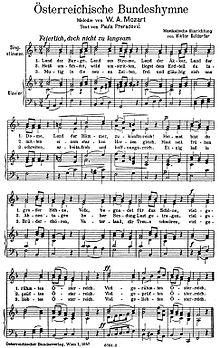National anthem of Austria
| English: National Anthem of the Republic of Austria | |
|---|---|
 Sheet music of the Austrian national anthem. | |
National anthem of | |
| Also known as | „Land der Berge, Land am Strome“ (English: "Land of the mountains, land by the river") |
| Lyrics | Paula von Preradović, 1947 (changed in 2012) |
| Music | Disputed (originally attributed to Mozart; possibly Johann Holzer), 1791 |
| Adopted | 1946 (music only) 1947 (with words) |
| Preceded by | „Sei gesegnet ohne Ende“ (as independent Austria) „Deutschlandlied“ and „Horst-Wessel-Lied“ (as part of Germany) |
| Audio sample | |
Instrumental, single-verse rendition | |
„Land der Berge, Land am Strome“ (say: lant dair BERR-ɡə lant am SHTROHM-ə, meaning "Land of the Mountains, Land by the River") is the national anthem of Austria. It became the country's national anthem in 1946. The music of the song was originally thought to be composed by Mozart, but nowadays, different composers disagree. The words of the song were written by Paula von Preradović.
History
[change | change source]Nineteen days before Mozart's his death on 5 December 1791, he composed his last complete work, the „Freimaurerkantate“, to which the melody of the Austrian national anthem is sung. But nowadays, many people do not believe that Mozart composed the tune for „Land der Berge, Land am Strome“; instead, many people think that it was composed by Johann Holzer[1] or Paul Wranitzky.[2]
Before the Second World War, Austria's state anthem was „Sei gesegnet ohne Ende“, set to the tune of Joseph Haydn's „Gott erhalte Franz den Kaiser“, which was the state anthem of Austria-Hungary. The German national anthem „Deutschlandlied“ uses the same tune, but with different words. The Nazis also used that tune, so to avoid being associated with them, singing that song was banned for some time after the war. Thus, a new anthem was created. The words of the new anthem were written by Paula von Preradović, who was one of the few women to have written words for a national anthem.[3] On 22 October 1946, the song became Austria's national anthem officially, but at the time, it did not have words. Her words were added shortly in February 1947. On 1 January 2012, parts of the words were changed to make the song more gender-neutral (in a similar manner to "O Canada" in 2018).
Attempts at gender-neutral language
[change | change source]Since the 1990s, there have been many times to change the words so that the anthem sound more gender-neutral. In 2005, Women's Minister Maria Rauch-Kallat of the Austrian People's Party (ÖVP) did not like the words sons, fraternal and fatherland, so she demanded that these be changed.[4] Austria's largest newspaper did not like this idea.
In January 2010, a female pop singer named Christina Stürmer presented a pop version of the sont „Heimat bist du großer Söhne und Töchter“ ("You are home to great sons and daughters")[5] as part of a campaign by the Austrian federal ministry of education. She was sued for copyright violations by the estate of Paula von Preradović, but she was later cleared by the Austrian Supreme Court of Justice[6] who called it "a mere modernisation" and allowed the version to stand.
Since 1 January 2012, a few words in the anthem are different from before. The text and notes of the anthem were officially put into writing in the „Bundesgesetz über die Bundeshymne der Republik Österreich“ (English: Federal act about the federal anthem of the Republic of Austria).[7]
Lyrics
[change | change source]German original
[change | change source]| Words of the song in German[8] | Pronunciation of these words using the IPA | Words of the song in English[source?] |
|---|---|---|
Land der Berge, Land am Strome, |
[lant dɐ ˈbɛɐ̯.gə lant am ˈʃtrɔ.mə] |
Land of peaks, oh, land of rivers, |
Slovene version
[change | change source]The last stanza was also translated into the Slovene language for the Carinthian Slovenes.
- Hrabro w nowie tschaß stopimo,
- prosto, werno, glei, hodimo;
- upa polnie, delawnie.
- Bratzkie sbor prißega hkratie,
- domowinie swestobo datie.
- Ljubljena nam Austria!
Parody
[change | change source]The same evening after von Preradović learned that the words she had written were chosen for the national anthem, her sons, Otto and Fritz Molden, made a parody of them.[9]
Land der Erbsen, Land der Bohnen,
Land der vier Besatzungszonen,
Wir verkaufen dich im Schleich!
Und droben überm Hermannskogel
Flattert froh der Bundesvogel.
Vielgeliebtes Österreich!
Land of the peas, land of the beans,
Land of the four zones of occupation,
we sell thee on the black market!
And up there over the Hermannskogel
gladly the federal bird flutters.
Much beloved Austria!
According to media researcher Peter Diem, the first two lines were popular in the schools of Vienna in 1955.[10]
References
[change | change source]- ↑ Werke zweifelhafter Echtheit – Band 3 Orchesterwerke und Lieder, vol. X/29/3, pp. xxxiii, xxxiv, Neue Mozart-Ausgabe (in German)
- ↑ Diederichs, Joachim [in German] (2018). "Von wem stammt die Melodie der österreichischen Bundeshymne?" [From whom is the melody of the Austrian national anthem?]. Österreichische Musikzeitschrift (in German). Vienna: Hollitzer Verlag. pp. 79–82. Archived from the original on 2019-06-07. Retrieved 7 June 2019., year 73
- ↑ "Austria—Land der Berge, Land am Strome". NationalAnthems.me. Retrieved 2011-12-01.
- ↑ "Austrian national anthem 'sexist'". BBC News. 26 September 2005. Retrieved 13 April 2008.
- ↑ Bildungshymne on YouTube
- ↑ Decision "Bundeshymne II/Rock me Paula", Supreme Court of Justice (Austria) (4Ob171/10s, 15 December 2010) (in German)
- ↑ Bundesgesetzblatt I Nr. 127/2011, 27 December 2011 (in German)
- ↑ Bundesgesetzblatt I Nr. 127/2011, 27 December 2011, text and melody (in German)
- ↑ Fepolinski und Waschlapski auf dem berstenden Stern. Bericht einer unruhigen Jugend [Fepolinsky and Waschlapski on a bursting star. Report of a troubled youth.] (in German). Vienna: Ibera & Molden. 1997. ISBN 3-900436-42-8.
- ↑ Land der Berge, Land am Strome von Peter Diem
